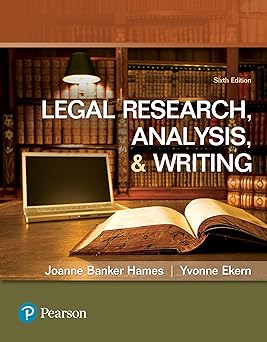Key Highlights
- •Comprehensive guide covering Legal Research, Analysis, *and* Writing.
- •Features a practical, step-by-step approach ideal for students.
- •Updated 6th Edition from experienced authors in legal education.
Description
Feeling overwhelmed by legal research? Struggling to structure a legal argument or draft that perfect memo? Dive into Legal Research, Analysis, and Writing 6th Edition by Joanne B. Hames and Yvonne Ekern – your essential guide to mastering these core legal skills! This book is the go-to resource you need to navigate the complexities of the legal world.
Who is this book for? This guide is perfect for first-year law students (1Ls), paralegal students, practicing paralegals looking sharpen their skills, and even new lawyers who need a practical refresher. If you're entering the legal field, this book is designed with you in mind.
What problem does this book solve? Let's face it, legal research can be daunting, analysis requires critical thinking, and legal writing demands precision. This book tackle these challenges head-on. It breaks down complex processes into manageable steps, helping you overcome the intimidation factor and build confidence. It shows you how to find the law, how to think about it, and how to write about it effectively.
What will you gain from reading it? You'll learn practical techniques for conducting thorough legal research using both online databases and traditional methods. You'll master the art of legal analysis, learning how to dissect cases and statutes. Crucially, this book help you develop strong legal writing skills, covering everything from objective memos to persuasive briefs. It's packed with clear explanations and likely examples to guide you.
Why is it worth reading? As the 6th edition, this book represents a refined and updated approach to teaching fundamental legal skills. Hames and Ekern provide a comprehensive, integrated framework, showing how research, analysis, and writing work together in real-world legal practice. Its practical, step-by-step approach makes it an invaluable tool throughout your studies and career. We definately reccomend it!
Ready to build a strong foundation in legal practice? Get your PDF copy of Legal Research, Analysis, and Writing 6th Edition today and transform your legal skills!
FAQ
Is this book suitable for someone completely new to law?
Yes, absolutely! It's specifically designed for beginners like law students and paralegal students, starting with the fundamentals of research, analysis, and writing.
Does the book cover online legal research databases like Westlaw or LexisNexis?
While details may vary by edition, comprehensive legal research guides like this typically cover both major online legal research platforms and traditional library research methods.
What kinds of legal documents does this book teach you to write?
It generally covers essential legal writing formats such as objective legal memoranda (memos), persuasive trial and appellate briefs, and potentially other common documents like client letters.
Is this 6th edition up-to-date with current legal citation rules (like Bluebook or ALWD)?
Being a 6th edition suggests it incorporates relatively current practices and citation standards prevalent around its publication time. Always double-check specific requirements for your course or jurisdiction, but it provides a strong foundation.
Are there practical examples or exercises included in the book?
Yes, textbooks like this almost always include numerous examples, templates, and often exercises or assignments to help you practice and apply the concepts learned.
Is the focus primarily on the U.S. legal system?
Yes, legal research and writing guides of this nature published in the US typically focus exclusively on the United States legal system, procedures, and sources of law.
Reader Reviews
About the Author
Joanne B. Hames and Yvonne Ekern are experienced educators with expertise in legal research and writing instruction. They have dedicated their careers to helping law students and paralegals build the essential skills needed for success in the legal profession, making complex topics accessible and manageable for newcomers.
